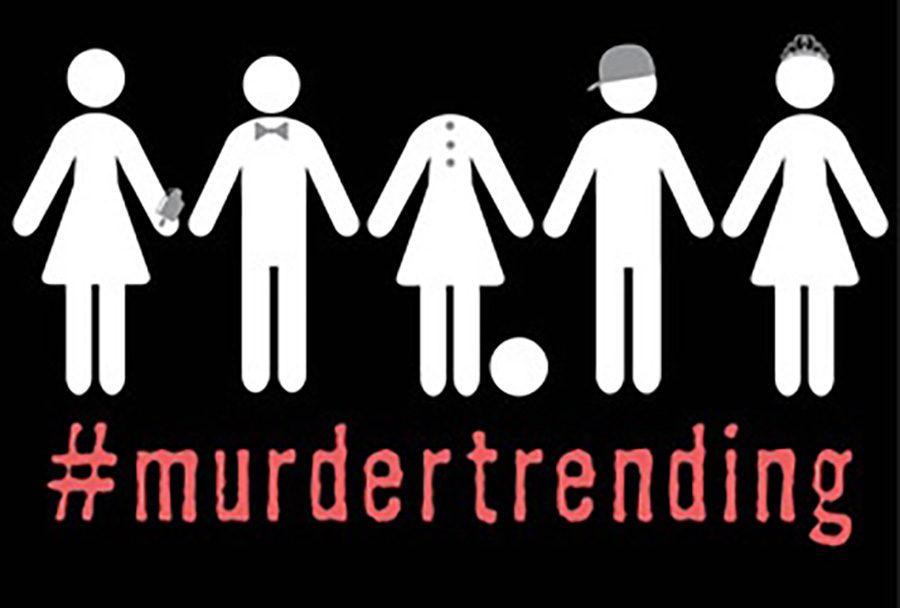Fiction not far from fact
A cautionary tale about murder
#Murdertrending tells the story of teenager Dee Gurerra and her televised fight for survival after being accused of murder. Written by Gretchen McNeil, this novel raises some serious questions about our own society.
August 30, 2018
Rarely now does a book do more than just successfully tell an entertaining story. Gretchen McNeil, however, has managed to do this with her newest novel “#murdertrending.”
Published Aug. 7, “#murdertrending” tells the story of Dee Gurerra, a teenager from California who has been accused of murder. However, Dee doesn’t receive a regular prison sentence. Dee lives in a world parallel to our own with one key difference: the most hardened of criminals do not go to jail, they go to Alcatraz 2.0. There they are filmed 24 hours a day, seven days a week until they are murdered (in supposedly entertaining and creative ways) for the public’s viewing pleasure. Despite being innocent, Dee finds herself at Alcatraz 2.0 for the alleged murder of her step-sister.
Desperate to prove her innocence, Dee and her new group of friends (nicknamed the Death Row Breakfast Club by viewers) work to survive and prove that there is corruption taking place on the island. As this story unfolds, McNeil intricately weaves together the past and present. The reader learns about what happened to Dee when she was younger and how that connects to what is happens within the book’s timeline.
The premise raises some interesting questions. How could this have happened? The eighth amendment prohibits cruel and unusual punishment, so how could the murder of people (innocent or not) for entertainment be allowed? This says a lot about not only the alternate government in the story but also our own. The world that Dee lives in is so similar to our own and calls to attention how easy it might be for something like this to come about here.
What is cruel and unusual punishment really? Some might say that torture qualifies, but then who’s to say what torture is? When the Nazis put people in concentration camps, that was torture, but when the U.S. government used waterboarding to interrogate people during the war on terror, that didn’t seem to count. Maybe one is worse than the other, but inflicting pain on people (innocent or not!) is still pain. Alcatraz 2.0 may seem like something that could never possibly be brought about, but is it really as outrageous as it seems?
In the novel, the reasoning behind how Alcatraz 2.0 came to be is that a powerful and wealthy man known only as The Postman came to the president (only referred to as a reality television star) and proposed the idea. As a former reality star might, they agreed because they and The Postman both knew how many views something like that could get. This seems to be another possible parallel to our world. Just think: a “reality star” becoming president isn’t that far-fetched at all.
So maybe this kind of thing could have gotten past the higher-ups, but why would regular, everyday people watch real murder whether it was hardened criminals or not? This is an easy question to answer — sensationalized murder. For whatever reason, people like to watch that kind of thing, even now. Shows about survival and themes of death are common in entertainment. Shows like “A Thousand Ways To Die,” “American Horror Story,” “Criminal Minds,” and “Law and Order: Special Victims Unit” all sensationalize violent death. Even this book in itself seems to feed on our fascination with death.
We tend to justify this fascination with comments about about how it isn’t real or how people deserve it, how it’s justified. In the story, people make the same excuses. The people justify wanting to watch the feed of Alcatraz 2.0 by telling themselves that these are hardened criminals. As the reader, though, you eventually come to realize that not everyone in Alcatraz 2.0 is guilty.
McNeil manages to tell an incredibly entertaining story, but she also weaves a cautionary tale that parallels our own world a little too well. It makes readers question everything they thought they knew about the way our government works and how easily we’re able to brush aside our morals.









